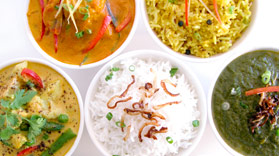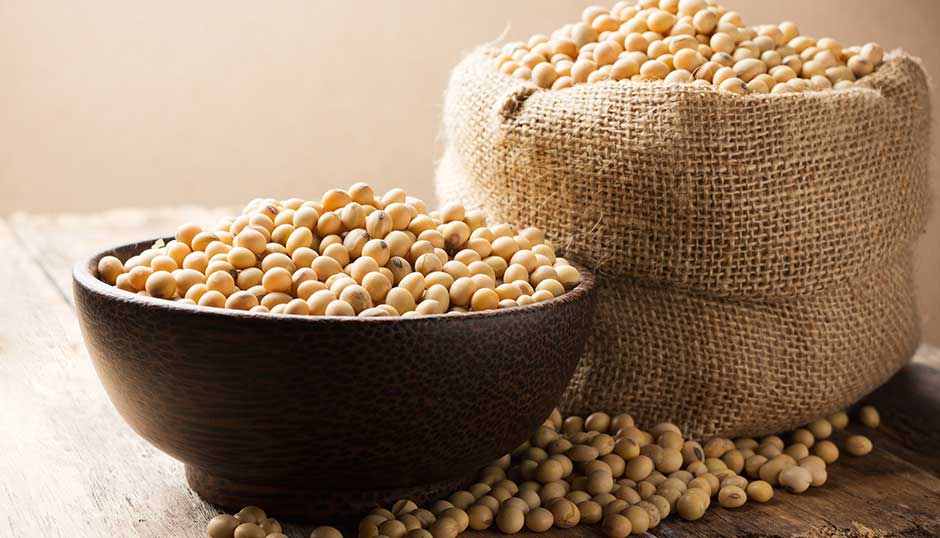If you are already eating a vegetarian diet or if you are considering moving in that direction, then simply by eating enough food from a variety of sources (consuming sufficient calories for your energy needs), you will automatically be getting enough protein. That’s because each and every plant food contains complete protein in varying amounts. Some plant foods, including broccoli, asparagus, bamboo shoots, and Brussels sprouts are very high in protein, containing a higher percentage of protein (as a percentage of total calories) than beef, milk or eggs.
Although many people are under the misconception that they need lots of protein to be healthy, in fact, high-protein diets have been linked to several health-related problems. Excess protein is broken down by the liver and excreted by the kidneys as urea. Urea acts as a diuretic, causing water and minerals to be lost from the kidneys. One of the most important minerals lost in this way is calcium.
Calcium loss is related to osteoporosis — brittle bones that can break very easily. Osteoporosis is a health problem affecting an estimated 2 million Australians, approximately 10% of the population. After the age of 60 years, 1 in 2 Australian women and 1 in 3 Australian men will sustain an osteoporotic fracture.
 It does not appear to be a problem, however, in countries where protein needs are met from the more traditional plant-based meals, such as the rice and vegetables of China; the beans, rice and tortillas of Mexico; and the vegetable curries and pea dahls of India. This has led many doctors, scientists, and researchers to conclude that the animal-based, high protein diet of the western countries may be responsible for our high rates of osteoporosis.
It does not appear to be a problem, however, in countries where protein needs are met from the more traditional plant-based meals, such as the rice and vegetables of China; the beans, rice and tortillas of Mexico; and the vegetable curries and pea dahls of India. This has led many doctors, scientists, and researchers to conclude that the animal-based, high protein diet of the western countries may be responsible for our high rates of osteoporosis.
Other problems associated with high-protein diets include kidney stones, reduced kidney function, gout, and cancer of the breast, prostrate, pancreas, colon, rectum and uterus.
A meat-based diet contains too much protein, which is not good for our heath. A vegetarian diet is usually lower in protein, provided you are not overdoing protein-rich dairy products or eating too many legumes. More than one meal a day of high-protein legumes such as beans, peas and lentils, can lead to protein-overload even in a vegetarian diet.
Rather than worrying about not getting enough protein (which is almost impossible if you are eating sensibly), we should be more concerned about our source of protein. If your protein is coming from animal sources, not only are you getting too much, but you are also getting cholesterol, saturated fat, no fibre, and no carbohydrate, and each of these extras can cause major health problems in their own right.
Will I become Iron Deficient?
Spinach has 14 times the iron of a typical sirloin steak! We all know the ad on TV with the steak and the pile of spinach. Well, once cooked the spinach reduces in size so much that it is around the amount that a typical person would eat if it were the main part of the meal.
Yes, meat is a decent source of iron, but vegetables are actually better. This is due to their Vitamin C content (which is not found in meat, dairy products, eggs, fats or sugar) that assists the absorption of iron. Good sources of iron are green leafy vegetables, dried apricots, prunes, peaches, raisins, dates, legumes, nuts, whole-grains, blackstrap molasses, tofu, alfalfa sprouts, peas, pumpkin seeds, wheat germ, bran, soy milk.
What about Vitamin B12?
In 1985, Dr M Klaper reported that vitamin B12 deficiency is extremely rare among vegetarians.
Excellent plant-based sources of B12 include tempeh, miso, fortified soymilk, seaweed, mushrooms, sour dough bead, parsley, yeast. People using a vegetarian diet should ingest a reliable source of B12 at least three times per week.
The main point here is to be relaxed enough about nutrition to be able to enjoy your vegetarian experience. Be adventurous and try new foods. Don’t be put off by seemingly long lists of ingredients, most of them are just herbs and spices and are easy to obtain.
Some famous vegetarians
Carl Lewis (athlete of the century), Greg Chappell, Albert Einstein (person of the millenium), Jerry Seinfeld, Leonardo da Vinci, Benjamin Franklin, Leo Tolstoy, George Bernard Shaw, Pythagoras, Plutarch, Gandhi, Bob Dylan, Martina Navratilova, Hayley Mills, William Shatner, Cliff Young, Spike Milligan, Anthony Robbins, Chrissie Hynde, Peter Brock, Lynda Stoner, Johnny Weissmuller, Marty Feldman, Paavo Nurmi, Killer Kowalski, Jenny Garth, Alicia Silverstone, Kim Basinger, Richard Gere, Peter Gabriel, Socrates, Plato, Sir Isaac Newton, Voltaire, Ralph Waldo Emerson, Albert Schweitzer, there are so many more!
